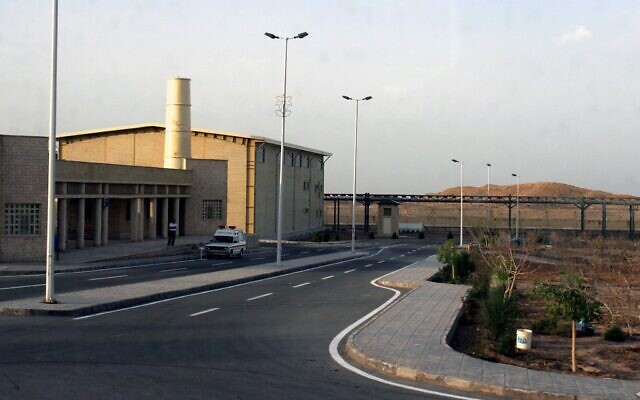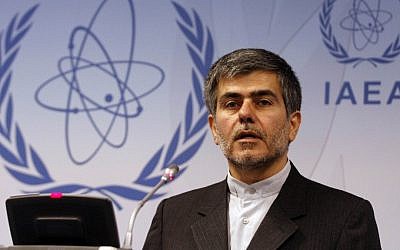Iran’s foreign minister said Tuesday that Israel made a “very bad gamble” if it believed its alleged sabotage at the Natanz nuclear plant would stop efforts to lift US sanctions on Tehran.
“If [Israel] thought that they can stop Iran from following up on lifting sanctions from the Iranian people, then they made a very bad gamble,” Mohammad Javad Zarif told a joint press conference with his visiting Russian counterpart, Sergey Lavrov.
“What they did in Natanz, they thought it would reduce Iran’s leverage” in the talks on bringing the US back into the deal, Zarif said. “But it makes it possible for Iran to legally, legitimately, and in order to make up for this terrorist stupidity, use any capacity it has at Natanz.”
He said the enrichment plant would be made “more powerful” with advanced centrifuges.
Zarif additionally said that “acts of sabotage” and sanctions will give the United States no extra leverage in talks on reviving the 2015 nuclear deal, which are set to resume on Wednesday.
“We have no problem with returning to implementing our JCPOA commitments,” he said, referring to the deal with major powers, which Washington quit in 2018.
“But the Americans should know that neither sanctions nor acts of sabotage will give them negotiation tools and these acts will only make the situation more difficult for them,” Zarif told a press conference alongside Lavrov.

File: Iran’s nuclear enrichment facility in Natanz, Iran (AP Photo/Hasan Sarbakhshian)
The US, Israel’s main security partner, is seeking to reenter the 2015 atomic accord aimed at limiting Tehran’s program so that it cannot pursue a nuclear weapon — a move staunchly opposed by Israel, particularly Prime Minister Benjamin Netanyahu.
The US has said it is prepared to lift or ease sanctions that are “inconsistent” with the nuclear deal along with sanctions that are “inconsistent with the benefits” that Iran expected to get from agreeing to the accord.
However lawmakers in Tehran have called for the discussions to be suspended in the wake of the incident at Natanz, although the US denied Monday that it was involved.
According to The New York Times, US officials said they did not know if their Iranian counterparts would show up in Vienna on Wednesday when the talks on the agreement were set to resume.
But Lavrov on Tuesday said Moscow expected the Iranian nuclear deal to be saved.
“We expect that it will be possible to preserve the Joint Comprehensive Plan of Action,” Lavrov said after the talks with Zarif in Tehran.

In this photo released by the Iranian Foreign Ministry, Iranian Foreign Minister Mohammad Javad Zarif, right, and his Russian counterpart Sergey Lavrov, pose for photos after the ceremony of signing documents, in Tehran, Iran, April 13, 2021 (Iranian Foreign Ministry via AP)
“As far as we understand, our partners in Tehran have expressed their readiness to immediately move in that direction” if Washington upholds agreements on its end, Lavrov added.
Russia’s top diplomat also criticized recent EU sanctions on Iran, saying they raised “a huge number of questions” while talks aimed at reviving the agreement on curbing Tehran’s atomic ambition were ongoing. On Monday, the EU added eight Iranian security officials, including the chief of the powerful Revolutionary Guard, and three notorious prisons to a sanctions blacklist over a 2019 protest crackdown.
The Sunday attack on the Natanz nuclear facility is casting a major shadow over the resumption of indirect talks between the US and Iran over resurrection of the international accord limiting Iran’s nuclear program.
The Times reported Monday that the blast that Tehran has blamed on Israel was caused by a bomb that was smuggled into the plant and then detonated remotely. The report cited an unnamed intelligence official, without specifying whether they were American or Israeli.
According to the official, the blast took out the primary electrical system as well as its backup.
The claim was apparently confirmed by the former head of Iran’s atomic energy organization in an interview with Iranian state television.

Fereydoon Abbasi Davani, Iran’s vice president and head of the country’s Atomic Energy Organization (Ronald Zak/AP)
“From a technical standpoint, the enemy’s plan was rather beautiful,” said Fereydoon Abbasi Davani, now head of the Iranian parliament’s energy committee. “They thought about this and used their experts and planned the explosion so both the central power and the emergency power cable would be damaged.”
Although the extent of the damage remains unknown, the Times said intelligence officials believed it would take many months for the damage to be undone.
The head of Iran’s Atomic Energy Organization, Ali Akbar Salehi, said that emergency power was already restored at the plant and enrichment was continuing, although it was unclear to what level. “A large portion of the enemy’s sabotage can be restored, and this train cannot be stopped,” he told Iranian media, according to the Times.
An unsourced Israeli Channel 13 TV report Monday said the plant was still non-functional, however.

FILE: The aftermath of an explosion and a fire at an advanced centrifuge assembly plant at Iran’s Natanz nuclear site, July 5, 2020. (Planet Labs Inc. via AP)
Channel 13 said the bomb went off Sunday at 4 a.m., when some 1,000 workers were at Natanz. The facility was reportedly evacuated immediately after the blast over fears of further bombs, but no other explosives were found.
The Channel 13 news report, which did not cite a source, said the explosive was placed near the main electricity line at Natanz and that when it detonated, the entire facility stopped functioning. The facility remains nonfunctional, the report said, with the program set back by months.
Natanz has previously been targeted, including by an explosion that rocked the facility last summer, in what was also said to have been an Israeli attack aimed at disrupting uranium enrichment and research at the site. In 2010, the United States and Israel allegedly halted Iran’s nuclear program with the Stuxnet virus, which caused Iranian centrifuges to tear themselves apart, reportedly destroying a fifth of the country’s machines.

Centrifuge machines in the Natanz uranium enrichment facility in central Iran, in an image released on November 5, 2019. (Atomic Energy Organization of Iran via AP, File)
The network also said Iran may now try to expand its operation at the underground Fordo plant, where it has over 1,000 centrifuges. There were some 6,000 centrifuges at Natanz.
Separately, the Kan public broadcaster reported that advanced centrifuges were damaged in the blast at Natanz. The report, which cited an intelligence source, did not specify which model of centrifuges were targeted. Iran publicly inaugurated the advanced IR-5 and IR-6 centrifuges at the facility on Saturday.
Iran blamed Israel for the attack, a day after it announced it had started up advanced uranium enrichment centrifuges banned under the 2015 deal, calling it an act of “nuclear terrorism” and vowing “revenge on the Zionist regime.”
Related posts:
Views: 0
 RSS Feed
RSS Feed

















 April 13th, 2021
April 13th, 2021  FAKE NEWS for the Zionist agenda
FAKE NEWS for the Zionist agenda  Posted in
Posted in  Tags:
Tags: 
















